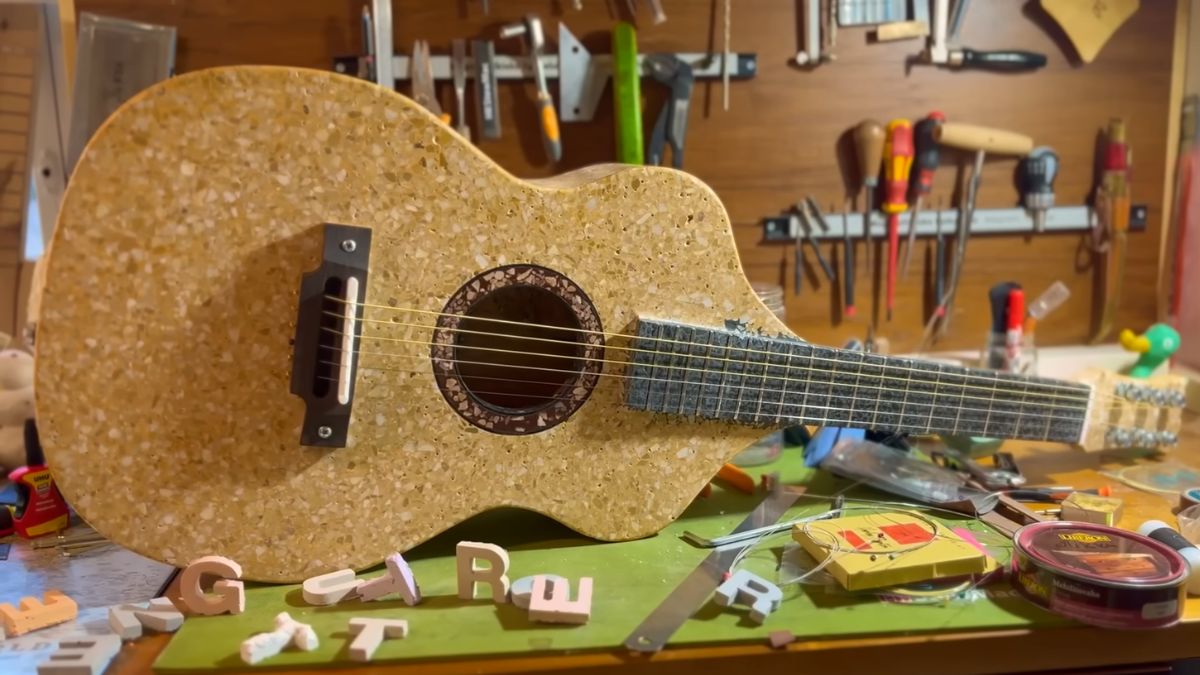Khruangbin discuss their musical process, uniting styles and cultures, and their favorite guitarists from around the world
The Texas three-piece return with an album replete with impeccable funk and richly embroidered guitar sounds from around the globe
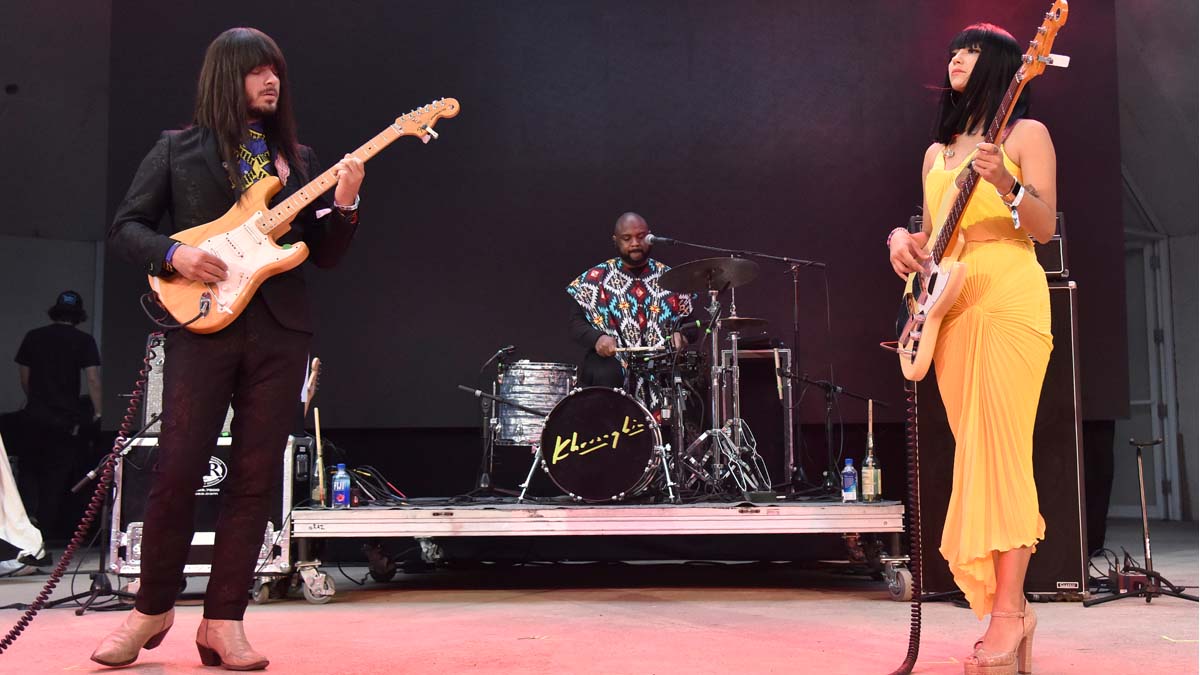
In case you’re wondering, it’s pronounced ‘krung-bin’. It’s a Thai word, meaning ‘aeroplane’, that increasing numbers of listeners have become familiar with solely because of the hypnotically danceable sound this Texan three-piece makes.
By turns mellow and psychedelic then assertively funky, the band’s sound is embellished with intricate guitar lines that take their inspiration from the music of… everywhere, from Congolese pop to the jazz-fusion of Roy Ayers. That could be a recipe for a worthy but pretentious fare, but the band wears its influences lightly and unselfconsciously.
The engine room of the music is the combination of superb bassist Laura Lee and the slick but understated beats of drummer Donald ‘DJ’ Johnson. This perfect fit is then richly decorated by the vivid threads of guitarist Mark Speer’s guitar lines, which range from trippy washes of sound to intricate, evolving melodies.
With the band’s third album hitting the streets, we joined the trio to talk about how they forge their unique sound.
Your first two albums were primarily instrumental, but Mordechai is full of soulful vocals. Why the switch?
Laura Lee: “We are very free-flowing in terms of what goes on our records. We don’t know what is going to happen until we are there. We threw vocals at the wall and they stuck and we liked them, so we went down that path for this record. That doesn’t mean anything for the next record.”
Playing bass while singing is notoriously difficult. Any tips?
Get The Pick Newsletter
All the latest guitar news, interviews, lessons, reviews, deals and more, direct to your inbox!
Laura: “I didn’t have to play and sing at the same time in recording, but I will have to live [laughs]. The only tip is to practise over and over and over again, slow the song down and practise slowly and then build it up over time, which is what you do when you are learning any instrument. Your piano teacher will tell you to play along to a metronome until you get it right at the slow tempo – and then you move on.”
Mark Speer: “It’s not just Laura Lee singing, in fact. We are all going to be singing it live, so we have to find little landmarks. I’m like, ‘Okay, I know this word happens when I play this note.’ So you find your landmarks and then you fill in the gaps. That is usually how I do it.”
Mark, your guitar parts are often free-flowing and sometimes intricate extended melodies. How do you go about writing them?
Mark: “I generally just improvise and record what I’m improvising. Then I’ll go back and cut it up and move things around. You create an arrangement or a refined melody, then learn that melody, and then play that over and over until it feels very, very natural. Then that is pretty much how I compose parts. Then we play them together and record it. That is kind of it.”
We get to watch it in action, and it can take hours for Mark to figure out what his part is going to be on the song, but his guitar brain is infinite
Laura Lee
Laura’s basslines are a beautiful balance of melody and economy. Do they tend to get written before Mark’s more ornate guitar lines go on?
Mark: “Yes, bass and drums first. And then I just come in and do my thing.”
Laura: “I mean, I think it works because we do put a stress on the bass and drums in all of our music – so I think it is good to have them come first. Otherwise, sometimes [bass and drums] can become supportive, but, also, Mark is super-expert [laughs], so I feel like it is good to give him a challenge to work around.
“You were talking before about the way Mark writes. We get to watch it in action, and it can take hours for him to figure out what his part is going to be on the song, but his guitar brain is infinite. He’ll play all kinds of different things on top of the same bassline. You’re talking, he could have 50 songs for every song, and then he takes parts from each of the takes and makes this beautiful thing out of it.”
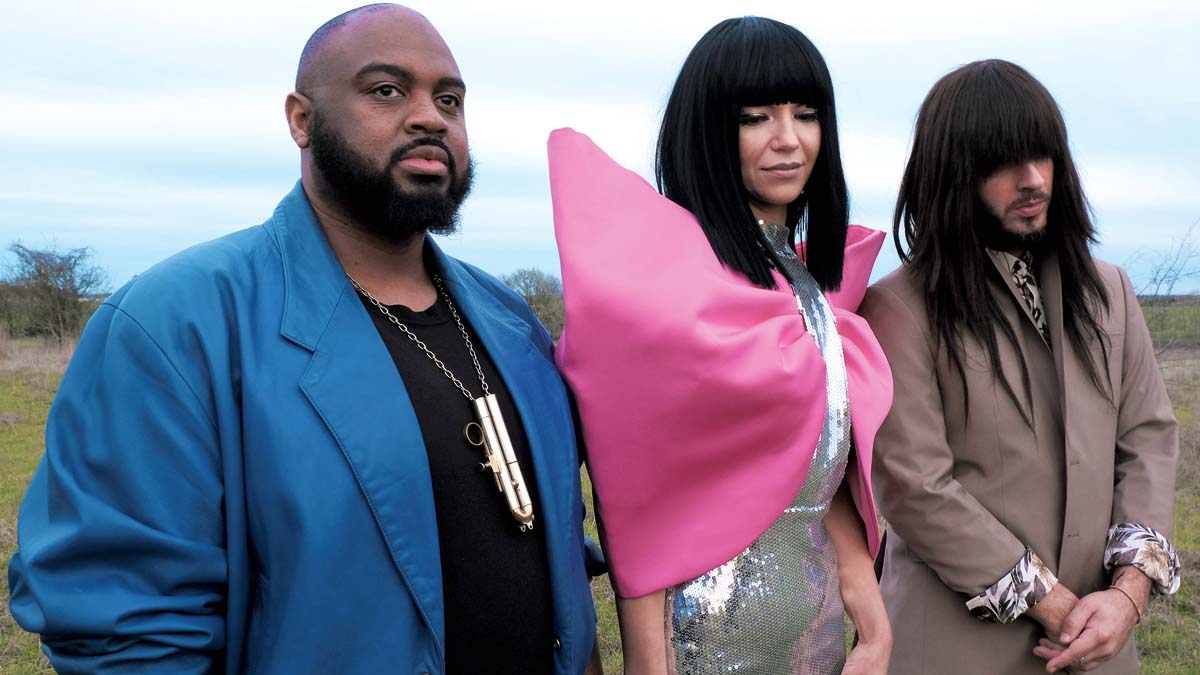
Was the lilting guitar on the track So We Don’t Forget inspired by Malian guitarists such Ali Farka Touré?
Mark: “I do love Malian guitarists, but that specific one is inspired by Congolese music, specifically Franco. The Malian guitar style… I feel like it is pretty different. We did have a chance to hang out and play with Vieux Farka Touré [son of Ali Farka Touré] last year. So I learned a lot by being around him, but, yes, that specific song is quintessentially my interpretation of Franco.”
Mark, you’ve built up a huge collection of guitar music from all corners of the world. Have you noticed any unexpected similarities between playing styles from widely separate cultures?
Mark: “The most recent one that kind of blew my mind was I was listening to a lot of Ethiopian music. There is this specific scale in Ethiopian music where it is a pentatonic. It is like a minor scale but you get rid of the 4th and you get rid of the 7th. So it is basically one, two, minor three, five, minor six, and then eight again. When you hear it you are like, ‘Oh, okay, that is the Ethiopian scale.’
I love Takeshi Terauchi. He does a really good job of approximating the sound of traditional Japanese string instruments inside of what he is doing
Mark Speer
“But, also, the other place that I hear it a ton is in Japan. Almost the exact same scale, just the phrasing is slightly different, the inflections are a little bit different, and it is in Japanese. But that was really interesting – I don’t know if it is a coincidence or what, couldn’t tell you, because that is a bigger question, but I found that fascinating to hear those two scales that are the same in these two different cultures. Yes, that’s a neat one.”
Who is your favourite guitarist from outside of mainstream Western music?
Mark: “Oh, that is a good one. I love Takeshi Terauchi. He is a Japanese guitarist. I just love how he would take traditional Japanese folk songs and then play them on his electric guitar and his rock band. So it has that scale that I’m actually trying to look up right now, to figure out what it is called. But just his whole vibe, it rocks.
“I mean, he is kind of fuzzy, he does a ton of whammy work through the 60s and 70s so it sounds really, really wild. He does a really good job of approximating the sound of traditional Japanese string instruments inside of what he is doing. There are just some killer cuts by him.
“I also really love [Skatalites guitarist] Ernest Ranglin, and I guess, I don’t know, maybe you would consider reggae music to be mainstream music these days. But at a certain point it was certainly not.”
Do we also detect a bit of a Roy Ayers influence on this album?
Mark: “Without question, man. Roy Ayers is one of my favourites. That’s the guy. I always listen to Roy Ayers. Pretty much every day I listen to a Roy Ayers tune. That is the shit because I guess it’s part of the Khruangbin DNA. You got your funky, worldbeat kind of vibe with really melodic guitars, but on the other side you have the jazz chords and the Roy Ayers chords.
“What I really love about Roy is I’m going to take this really beautiful big Cminor7add9, with maybe a 4th in there, too. Just like this big chord, right? I’m just going to move it up to 4th, move it down to 3rd, move it down, you know, to 2nd. It is almost like you sample this wicked chord and just move it around like house music. I love that. So, yes, big time.”
Laura: “His music is also the definition of cool. It just oozes cool – and then I feel like the music is reflective of what you would imagine hanging out with Roy Ayers to be.”
You got your funky, worldbeat kind of vibe with really melodic guitars, but on the other side you have the jazz chords and the Roy Ayers chords
Mark Speer
Your recorded sound is always really punchy but also warm and natural sounding. How do you achieve that in the studio?
DJ: “I wish Steve [Christensen] were here, our engineer. He is the genius behind putting up all the mics and capturing this the way that he does. One of my favourite pieces of kit that he uses is the Coles 4038 ribbon microphone, which is fantastic.
“I mean, pretty much wherever you place it – usually he places it right around the tom area – it just captures the entire kit. It sounds good and you could just use that one mic always if you wanted to. So it’s probably my favourite piece of gear.”
Laura: “I’m not a big gear person, but I think what he does is probably more simple than people imagine, or maybe it is exactly what they imagine. He always says with Khruangbin he just puts a few mics up and we just sound like us.
“I think it is also he intuitively knows us better now as players because this is our, what, fifth recording session, sixth recording session with him. So he knows what he is going to get. We have pretty much stuck to our original formula from the beginning to now.”
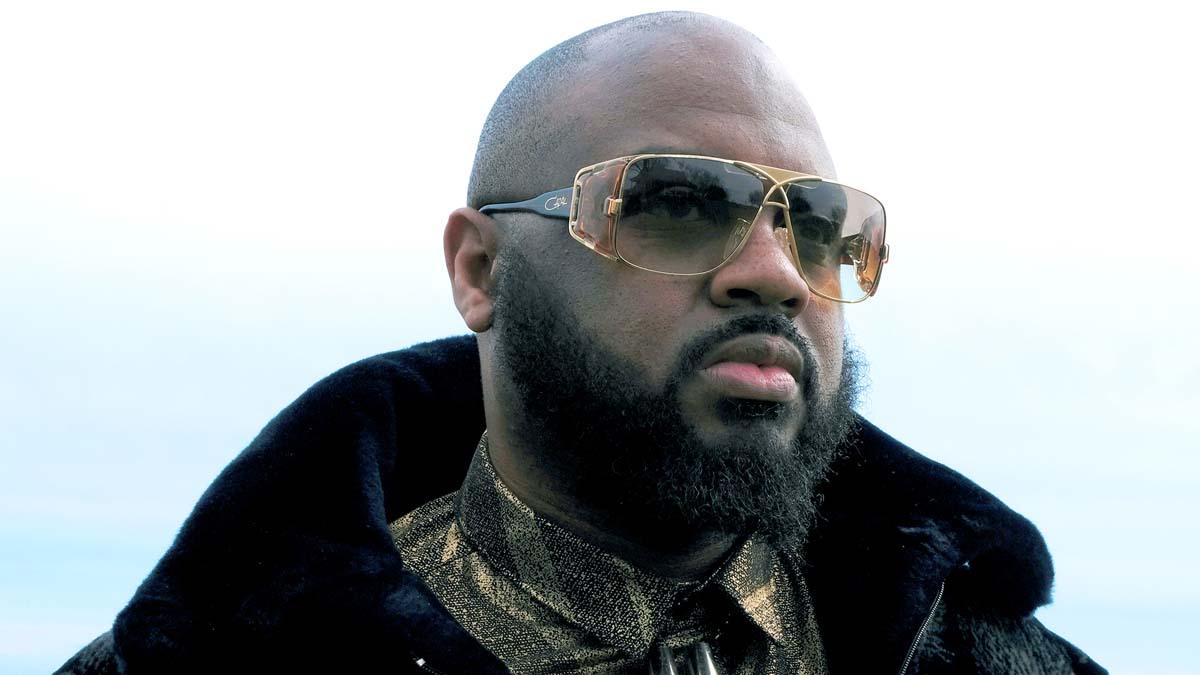
Donald DJ Johnson is the rocksteady rhythm master behind Khruangbin’s sound. Here he explains what makes some guitarists more rewarding to work with than others…
“I think for me it is all about approach. The thing that I really appreciate about both Mark and Laura is that they approach their instruments not like people would normally approach them. So Laura doesn’t approach playing bass like a typical bass player and Mark doesn’t approach playing guitar like a guitarist.
“Most of the time, he is trying to find ways to make his guitar not sound like a guitar or how to voice things not like a guitarist would voice them. Laura Lee, instead of focusing on, ‘How can I make this sound cool and technical?’, she focuses on, ‘How does it feel? What does it sound like? Does it make me dance? Are my hips moving?’ If the hips aren’t moving, she’ll toss it in the garbage and find something else.
“I think that is the biggest thing that you have to remember, as far as approaching the instrument goes, is that you are making music for other people – because it is literally what we are doing. We are making music for the people. You have to be selfless in a way and kind of get yourself out of the way to make that happen.”
Mark, you generally stick to a Strat and Deluxe Reverb. But the effects seem a bit more diverse on this record…
Mark: “I have been using the same pedalboard setup for pretty much every KB record. So the integral parts are the Dunlop Cry Baby, the Boss [PH-3] Phase Shifter, the Boss DS-1, the MXR Dyna Comp, an Electro-Harmonix Holy Grail. That’s for all the reverb – I don’t use the amp reverb. That is what usually happens on the record.
“On this album I also added an MXR Micro Chorus and a DigiTech Whammy. The Micro Chorus was just for things like So We Won’t Forget, and also Pelota, just to emulate a double-course instrument. That is why I’m using chorus, to get that two-string sound.
“The Whammy is there on the very first track, First Class, to emulate those Roy Ayers chords, man. It just adds a 5th to everything I’m playing. It is not like I’m doing divebombs. That is not really my move [laughs].”
Where does the album’s title come from? It’s kind of unusual…
Laura: “I went through a lot last year, personally, just because I don’t think I realised how swept away I had got with touring and with just the world and lifestyle that I was living. I love it, I can’t wait to get back in it when the world allows for it again, but, yes, I hadn’t realised how taken away with it I got.
“Reality becomes strange, especially because we turn into these alter egos when we are on stage. That persona holds up when we are in character for any stretch, backstage or with fans, and so when you are on tour I was ‘Laura Leezy’ [Laura’s flamboyant stage persona] more often than I was Laura Lee.
“So I was yearning to get in touch with myself off tour. I went camping with friends, which is a sort of bare-bones thing you can do. It is primal as it gets and while I was there I met a family that reminded me of my grandfather’s side of my family, including this guy named Mordechai, and he was great and we just hung out.
“He heard that I had just come off this 10-week tour and my head was spinning. So he reached out and was like, ‘Hey, if you have time next week, come and hang out with me and my family.’ So I did and we went on this beautiful walk and it was really nurturing and really special to me. I thanked him the week after for taking me on it because I was like, ‘You’ll never know how much that walk meant to me. I needed it.’
There is a lot of darkness in the world around us and it is important to always see the light and spread the light. Not just be immersed in the dark
Laura Lee
“He was like, ‘Laura, everything is two ways and my twin sons will be able to say, for the rest of their lives, that they went on a hike with a rock star. So it is all good.’ Then it hit me in that moment, when he said that. I was like, ‘You know what? What if I named the album, Mordechai? Then his kids would really have something there, you know?
“There is a lot of darkness in the world around us and it is important to always see the light and spread the light. Not just be immersed in the dark. I think that experience was that for me. It was a light in the darkness, and I hope that our music can be that.”
- Khruangbin’s new album, Mordechai, is out now on Dead Oceans
Jamie Dickson is Editor-in-Chief of Guitarist magazine, Britain's best-selling and longest-running monthly for guitar players. He started his career at the Daily Telegraph in London, where his first assignment was interviewing blue-eyed soul legend Robert Palmer, going on to become a full-time author on music, writing for benchmark references such as 1001 Albums You Must Hear Before You Die and Dorling Kindersley's How To Play Guitar Step By Step. He joined Guitarist in 2011 and since then it has been his privilege to interview everyone from B.B. King to St. Vincent for Guitarist's readers, while sharing insights into scores of historic guitars, from Rory Gallagher's '61 Strat to the first Martin D-28 ever made.
“There’d been three-minute solos, which were just ridiculous – and knackering to play live!” Stoner-doom merchants Sergeant Thunderhoof may have toned down the self-indulgence, but their 10-minute epics still get medieval on your eardrums
“There’s a slight latency in there. You can’t be super-accurate”: Yngwie Malmsteen names the guitar picks that don’t work for shred
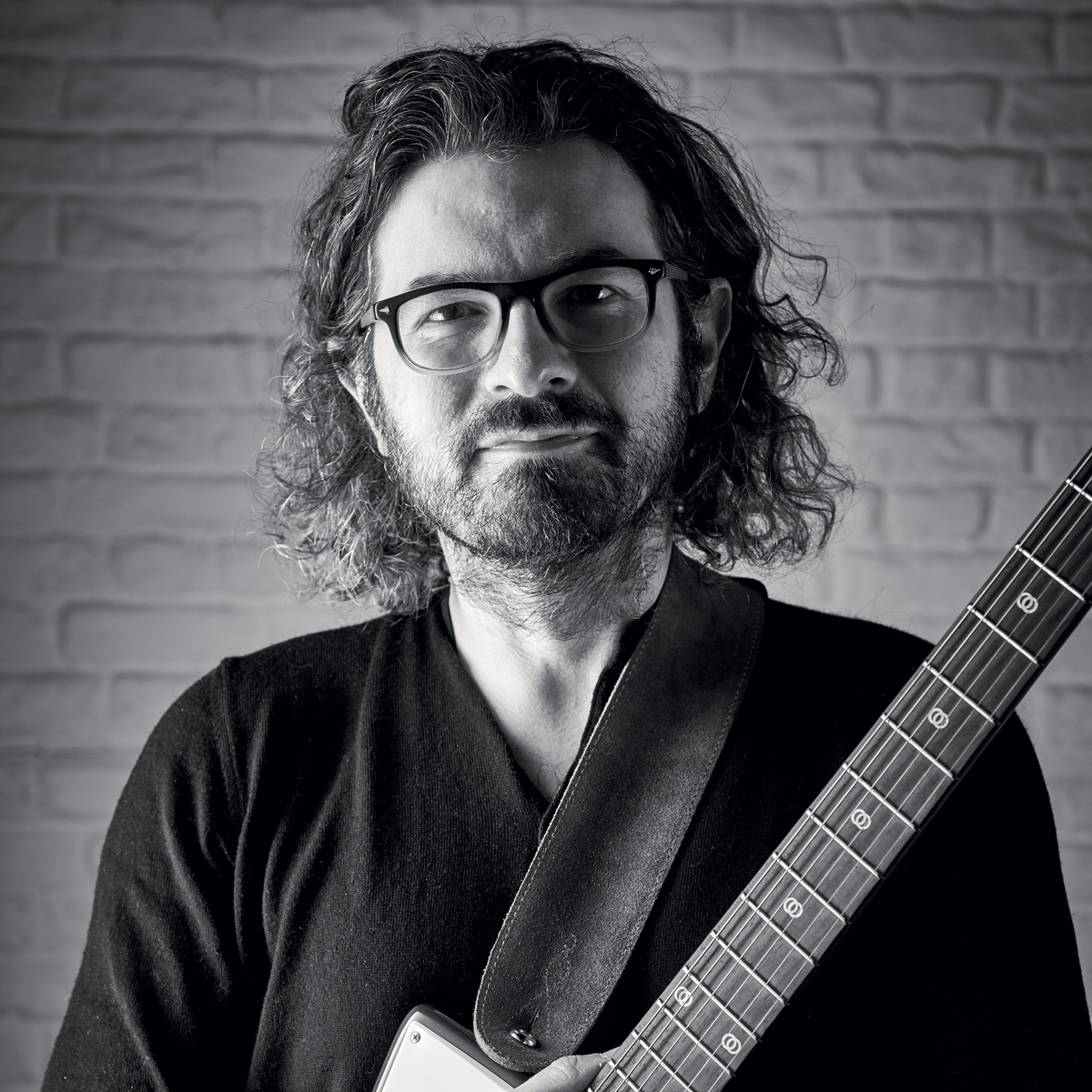

![A black-and-white action shot of Sergeant Thunderhoof perform live: [from left] Mark Sayer, Dan Flitcroft, Jim Camp and Josh Gallop](https://cdn.mos.cms.futurecdn.net/am3UhJbsxAE239XRRZ8zC8.jpg)








